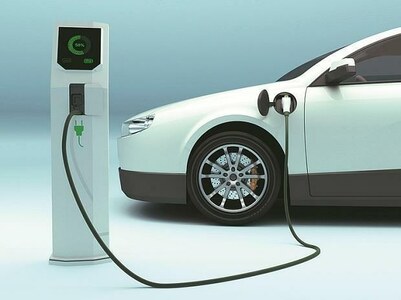Government Unveils National Electric Vehicle Policy 2025-30
ISLAMABAD: The government has officially introduced the National Electric Vehicle (NEV) Policy 2025–30, which seeks to decrease carbon emissions, lower fuel imports, and stimulate domestic electric vehicle (EV) manufacturing.
Speaking at the launch event, Special Assistant to the Prime Minister on Industries, Haroon Akhtar Khan, stated that the policy would both bolster Pakistan’s economy and shield the nation from the severe consequences of climate change. He hailed the policy as a groundbreaking initiative towards eco-friendly, economical, and sustainable transportation. Over the next five years, the government plans to allocate a total of Rs100 billion in subsidies for electric vehicles.
A primary objective of the policy is to ensure that electric vehicles constitute 30 percent of all new vehicles by 2030. This transition is projected to conserve 2.07 billion litres of fuel annually, equating to about $1 billion in foreign exchange savings. Furthermore, it is anticipated to reduce carbon emissions by 4.5 million tons and decrease health-related expenditures by $405 million each year.
To encourage adoption, the government has earmarked Rs9 billion in subsidies for the fiscal year 2025–26. This funding will facilitate the distribution of more than 116,000 electric bikes and over 3,000 electric rickshaws. Notably, 25 percent of the subsidy is specifically reserved for women, aiming to provide them with affordable and environmentally sound mobility options.
To further promote the localisation of EV production, the government is providing tax exemptions on EV components and has extended incentives under the AIDEP tariff structure until 2026. Haroon Akhtar Khan highlighted that this policy has the potential to save Pakistan up to Rs800 billion in the next five years and urged all relevant parties to collaborate in realising this vision of clean transportation.
Khan remarked that the new EV policy aligns with the Prime Minister’s vision of promoting clean, sustainable, and affordable transportation while simultaneously supporting the local industry and safeguarding the environment. He stressed that the transport sector is a significant source of carbon emissions in Pakistan, making reforms in this area essential.
He mentioned that a fully digital platform has been launched to ensure transparent online application, verification, and subsidy disbursement processes. Moreover, the policy includes plans to establish 40 new EV charging stations on motorways, spaced an average of 105 kilometres apart. It also encompasses the introduction of battery swapping systems, vehicle-to-grid (V2G) schemes, and the mandatory inclusion of EV charging points in new building regulations to facilitate wider adoption in urban areas.
To incentivise domestic manufacturing, support is being extended to local producers. At present, over 90 percent of components for two- and three-wheeled vehicles are already produced locally. The government will also roll out dedicated support packages for small and medium enterprises (SMEs) to further enhance localisation. The AIDEP tariff facility will remain in effect until 2026 and will be gradually phased out by 2030.
The special assistant mentioned that the policy was formulated through consultations with more than 60 experts, institutions, and industry players, under the guidance of a steering committee established by the Ministry of Industries and Production since September 2024. The steering committee conducted monthly and quarterly review meetings, while the Auditor General of Pakistan will carry out a performance audit every six months.
He emphasised that the NEV Policy 2025–30 represents not only an environmental advancement but also a cornerstone for industrial development, local employment generation, energy efficiency, and technological independence in Pakistan. He expressed optimism that federal and provincial governments, the private sector, and citizens will collaborate to achieve this vision of a clean, modern, and sustainable transport system.
SAPM affirmed that the policy signifies a decisive step towards clean energy, sustainable transportation, and industrial progress. It provides a thorough and results-oriented strategy aimed at guiding Pakistan towards a cleaner and more sustainable future.
He also noted that domestically produced goods are 30–40 percent more cost-effective than imported alternatives. Specifically, in the two-wheeler sector, over 90 percent of parts are currently manufactured locally. Considering Pakistan’s susceptibility to climate change, the EV policy will make considerable contributions to achieving global carbon reduction objectives.
The policy is projected to generate savings of approximately Rs800 billion over the next five years through reduced fuel imports, the utilization of affordable electricity, and revenue generated from carbon credits. Charging vehicles with electricity will also decrease capacity payments from Rs174 billion to Rs105 billion, and carbon credits could potentially generate around Rs15 billion in revenue. The country’s total energy requirement for EVs over the next five years is estimated at 126 terawatt-hours, which can be accommodated utilizing the existing surplus in the national grid.
An electric rickshaw or bike user can expect to recover their initial investment within one year and 10 months, owing to the lower charging costs compared to petrol. For example, if the additional cost of an electric bike is Rs150,000, this can be recovered in under two years through fuel savings.
He concluded by stating that the government has also granted exemptions on customs duties and sales tax on EV parts to support the local industry. “This policy should be fully embraced by Pakistan, as it is a transformative measure for our economy, environment, and industrial landscape,” Akhtar affirmed.



Comments (0)
No comments yet. Be the first to comment!
Leave a Comment